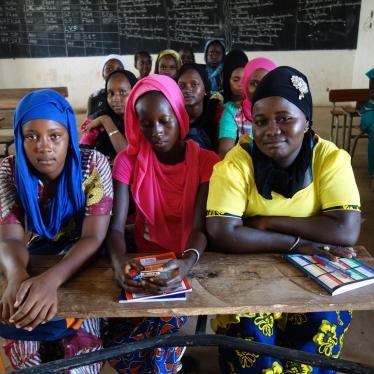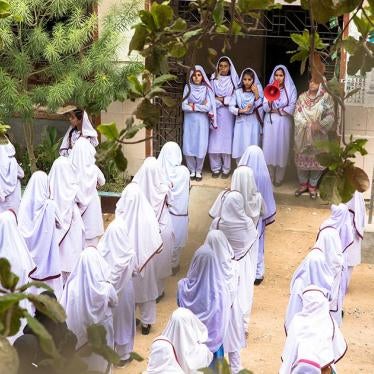We write to you regarding recent developments in Burma and the forthcoming EU foreign ministers debate on reviewing the Common Position on Burma on April 23.
The EU has made positive gestures to support the nascent reforms in Burma, including pledging of €150 million for humanitarian assistance, and high-level visits by a number of EU foreign ministers. At this critical juncture, the EU will need to decide which sanctions should be suspended, such as visa bans on select individuals and restrictions on development assistance, while others should for now be maintained, including sanctions on sectors where the military maintains control, such as on gems, timber, and named enterprises.
The results of April 1 by-elections in Burma show just how much the Burmese people want reform and respect for human rights, and the depth of their support for democracy leader Aung San Suu Kyi and the National League for Democracy (NLD). It is a very positive step that they have been given the right to express their aspirations in this way, a step that should be recognized by the European Union.
While the NLD’s victory at the by-elections will make it harder for reactionary forces in Burma to pull the country backwards, they do not guarantee that Burma will move forward. The political opposition may have a monopoly on legitimacy in Burma, but the military still has something close to a monopoly on power – it runs the key ministries, does not answer to parliament or the courts, and can veto constitutional changes. The constitution still gives the military the right to appoint 25 percent of the seats in parliament. The commander in chief of the army continues to have the constitutional right to appoint and dismiss the president. The military continues to monopolize vast sectors of Burma’s economy and controls resources Burma earns from exporting natural resources. Even if reformers in the government are serious about tackling these problems, it will take time for them to do so and overcome potential resistance from the military itself.
The government still hasn’t made most of the legal, political and economic reforms necessary for Burma to move from dictatorship to democracy – reforms that may threaten some of the military’s core interests. Everything that has been granted in recent months, largely thanks to the good will of the president, can be taken away. It’s not clear that the military will eventually allow a real transfer of power to a government led by those elected by the free will of the people. The elections that really count are in 2015.
Sanctions have played a role in getting Burma to the hopeful point that it is today. While most of the pressure for change has come from within, the government now wants international legitimacy and greater economic engagement with the West. In this critical period, sanctions have given the democratic opposition negotiating leverage with the government, allowing it to bargain for entry into parliament, and the start of a reform process, as a condition for asking that sanctions be eased. It is essential to send some positive signals to the leadership now that they have taken initial steps. But the EU and the domestic opposition will need to maintain some leverage to influence the much harder decisions to come.
It is also important to ease sanctions, in a way that favors the forces of progress towards human rights and rule of law in the country, while continuing to disadvantage those holding progress back – including military leaders still engaged in human rights abuses in conflict areas and military owned companies.
In light of this, the EU should now consider several positive steps – for example, further easing of visa bans, and increases in humanitarian and development assistance. Visa bans and asset freezes against named individuals in Burma that are not high-ranking military officials or their close associates could potentially be lifted, subject to a careful review to determine that they do not bear responsibility for abuses, while sanctions against key uniformed leaders of the armed forces should be maintained.
The EU should also maintain restrictive measures against sectors of the economy like gems, timber and mining. These and other natural resource industries are monopolized by the military, managed in a way that fuels corruption, and have the effect of increasing the autonomy and impunity of the military vis-à-vis civilian officials. These sectors are also concentrated in areas of the country still beset by conflict, where the military continues to commit grave human rights abuses against the civilian population.
Lifting sanctions on gems and timber, for example, would not advance reform in Burma – to the contrary, it could reinforce economic practices that empower reactionary forces and diminish incentives for reform. It would also be a breach of faith with the ethnic minority communities, given that Burmese army abuses against ethnic minorities continue with impunity, and these minorities have little say in how the government pursues development in their parts of the country. For instance, fighting has been ongoing since June 2011 in Kachin State, with 75,000 people displaced as a result. Human Rights Watch’s report, “‘Untold Miseries:’ Wartime Abuses and Forced Displacement in Burma’s Kachin State,” documents serious abuses by the Burmese army against ethnic Kachin civilians, including forced labor, targeting of civilians, torture, and ill-treatment. We urge that the EU’s arms embargo against Burma should not be subject to review or removal, in light of ongoing abuses in conflict areas, will human rights and humanitarian law violations continue with impunity.
Sanctions should be lifted step by step, over a period of perhaps three years, in response to significant and specific steps towards reform and greater respect for human rights by the Burmese government. The easing or suspension of sanctions should proceed in a manner that recognizes progress but preserves the leverage of the EU and of Burma’s opposition and civil society, in the lead-up to the most important test of the government’s commitment to change, the 2015 elections.
Burmese government actions that could trigger positive responses include, for example:
- Releasing all remaining political prisoners;
- Instituting a credible process to review cases in which there is a disagreement about whether the person is imprisoned for political reasons;
- Allowing international and local humanitarian organizations and independent human rights monitors unhindered access to conflict areas and the delivery of adequate amounts and kinds of humanitarian aid;
- Invoking a zero tolerance of serious human rights and humanitarian law violations in Burma’s conflict areas, investigate allegations of crimes, discipline and prosecute perpetrators and compensate victims;
- Reforming laws that criminalize free expression and allow censorship of the media;
- Bringing Burmese law and practice into conformity with international standards on fundamental freedoms, including expression, association, and assembly;
- Altering constitutional provisions that give the military powers over the civilian government and that prevent it from being accountable to civilian control;
- Creating a climate conducive to free and fair elections in 2015; and affirming that the government is prepared to transfer power to whoever wins those elections;
- Fulfilling all of the recommendations of the ILO Commission of Inquiry on Forced Labor in Burma.
We do not advocate that the EU or other actors develop or endorse a precise roadmap or matrix to ease or lift sanctions, in which they promise specific rewards in exchange for specific steps such as those listed above. We recognize that significant actions by the Burmese government should trigger positive responses but pre-arranged inducements could be counter-productive, including if the international community is forced to reward a step forward in one area while the Burmese government is stepping back in another. The international community should maintain the flexibility to respond appropriately if progress in one area in Burma is accompanied by setbacks in another. At every stage, it should consult with opposition leaders, civil society groups (including trade unions), and reformers in the government before moving forward.
When conditions in Burma warrant the EU moving to permit investment and trade in mining, timber and gem sectors and with the Burmese partners that are subject to sanctions, new rules should be put in place setting out core requirements for responsible, rights-respecting trade and investment in Burma. In preparation for that time, the EU should begin now to consult with civil society to develop strong accountability and transparency measures for businesses active in Burma.
We look forward to an opportunity to discuss these matters with you further.








